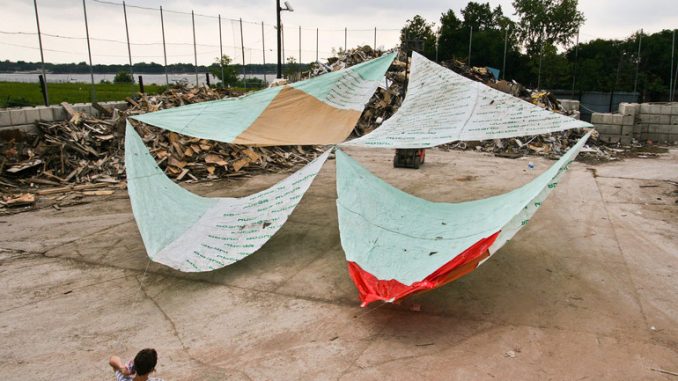
The Student Center’s brand new eco-friendly trash system has students rethinking where to put their waste. But one organization wants students to turn it into artwork.
Recycled Artist in Residency aims to change people’s perspectives of wastefulness.
“Is it really waste if you can make art out of it?” said Kathleen Grady, director of the Office of Sustainability at Temple.
RAIR held a tour of their Northeast Philadelphia facility for Temple students on Oct. 24. Through such tours, the organization hopes it will challenge Temple students’ views of waste.
RAIR is an offshoot of Revolution Recovery, an organization dedicated to sustainability through recycling in Philadelphia and surrounding areas. The organization helps to recycle for businesses, commercial operations and homeowners, with a mission statement “to keep materials out of landfills,” as stated on their website.
The statement also promises “to create awareness about sustainability issues through art and design” and gives artists the opportunity to apply for residency, which offers them a workspace and “waste” materials to work with for their projects.
Residents come from various backgrounds. All artists are invited to apply and chosen through an annual application processes.
“A lot of our artists are sculptors, but [RAIR] isn’t exclusive to sculptors,” Fern Gookin, RAIR’s co-founder said. “We’ve had photographers, printmakers, musicians, theater – people that are all interested in having a residency at RAIR.”
“It’s a variety of artistic disciplines, and they aren’t necessarily environmental artists,” Gookin added.
Students from any major were welcome on the tour, but Grady said the event was planned specifically with Tyler students in mind.
“[For] Tyler students, we really want to encourage them to think about ‘How do you use the materials you use to create art, and is this an alternative way to think about things?’” Grady said.
Temple uses Revolution Recovery, RAIR’s parent organization, to recycle its construction waste, so Grady said the tour is a good way for students to familiarize themselves with additional green organizations citywide.
“We’re giving people an opportunity to see what professionals in the field are using,” said Katy Ament, senior environmental studies major and outreach assistant for the Office of Sustainability.
“We always like to bring our students off campus to just see that sustainability isn’t just something that’s happening at Temple or just happening in the policy side at the city level – that it’s happening at the grassroots level,” Grady added.
Gookin believes RAIR has an impact on the artists it works with over time.
“More often than not, environmentalism isn’t the forefront of their work,” Gookin said.
However, Gookin said many students “note that it was very powerful just to be in the place, to be at the recycling center. It changes the way they interact with waste in their lives, not just when they’ve been here but in their lives as well.”
The four program areas of RAIR are the residency program, education and awareness, material sourcing and exhibitions. There are currently eight artists with residency at RAIR for 2014.
Artists who have already completed residencies have worked with various mediums and styles, including printmaking, with instruments made of waste.
Temple’s tour of RAIR is part of the Office of Sustainability’s ongoing effort to involve students in sustainability and is an attempt to show how sustainability can begin at the “grassroots level” and continue to have an impact in the world outside of Temple, organizers said.
Vince Bellino can be reached at vince.bellino@temple.edu



Be the first to comment